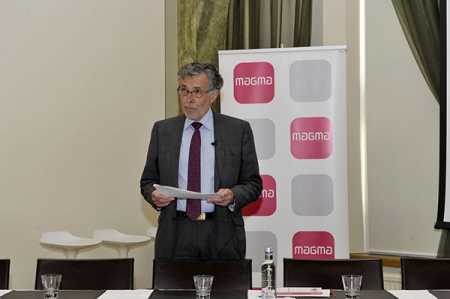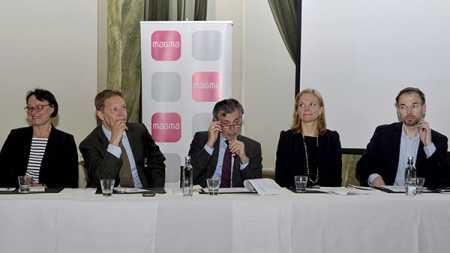|
Wed, 03 Jun, 2015 12:06:27 AM Enestam and Henricson table four alternative models FTimes – STT Report, Jun 3  Jan-Erik Enestam, placed his "one municipality, two languages model" at a seminar in Helsinki on Tuesday. Photo – Lehtikuva. Municipalities should have the opportunity to experiment with different models of governance to safeguard the functioning of bilingualism.
The “one municipality - two languages” model was presented by former chair of the Suomen ruotsalainen kansanpuolue (Swedish People’s Party of Finland) Jan-Erik Enestam and former mayor of Porvoo Marcus Henricson on Tuesday.
The two proposed a bilingual municipal model in which the Finnish and the Swedish educational and cultural activities would have separate boards.
The report by Enestam and Henricson is a result of merger of municipalities and a trend towards larger units.
Both monolingual and bilingual municipals are involved in municipal mergers.
Enestam and Henricson proposed four alternative models that will make it possible to serve all the residents in their own language.
“There are big circumstantial differences between the language groups," Henricson said.

Finnish Local and Regional Authorities Director Kristina Wikberg,Marcus Henricson, Jan-Erik Enestam, Senior Adviser, Ministry of Finance Suvi Savolainen and Markus Österlund at the seminar on Tuesday. Photo – Lehtikuva. The two also proposed, among other things,local authority and regional freedom of choice.
Markus Österlund, the Secretary General of the organisation which represents the interest of Swedish speaking population in Finland, the Swedish Assembly of Finland-Folktinget is, however, not fully supportive of the local authority idea.
“The more you delegate the more difficult it is to demand accountability. There is no reason to experiment with fundamental rights,” Österlund said.
However, in Enestam and Henricson's views, there is a clear need of the new operating models.
According to Enestam and Henricson, democratic deficit will arise as new, larger municipalities are formed and jurisdiction of decision making falls within a single authority.
They, however, admitted that the new models have to be reviewed in line with the constitution.
For example, the requirement for municipal employees to be proficient in Finnish and Swedish should not be made binding.
“It would be unreasonable to require full knowledge of Swedish in every place,” Enestam said.
Kristina Wikberg, who oversees Swedish speaking affairs at the Association of Finnish Local and Regional Authorities, welcomed the suggestions presented.
According to Wikberg, running of municipal affairs cannot remain the same after the merger of municipalities.
“I believe the new government will give more room for experimentation,” Wikberg said.
More News
|
|
Finland Times
| Wednesday, 14 January, 2026 |

